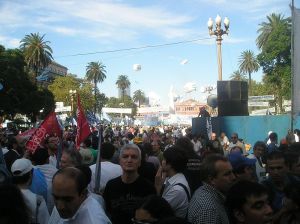A Nation on Strike
As Argentina’s President Cristina Fernández de Kirchner lay hospitalized with a colon infection, yet another worker strike occurred at the Cargill soybean crushing facility in Rosario, the nation’s agro-industrial center. On Monday November 3rd, 400 workers walked out of Villa Gobernador and Punta Alvear crushing plants, 2014 for an indefinite strike, effectively paralyzing operations. The protest was mainly in response to the employment of nonunion workers, and by the next day, union leaders lifted the strike after the government intervened and agreed to undergo negotiations. Port workers and grain inspectors in Argentina also began a strike demanding union rights on Wednesday November 5th, 2014. Port workers have staged many walkouts at Rosario over the past few months, slowing exports from one of the largest international suppliers of soybean, wheat, and corn. According to the leader of the Union of Grain Recipients of Argentina (URGARA) Alfredo Palacio, the strike was initiated in the hopes of meeting with national authorities with the strikers citing “unfair dismissal of workers from the terminal”. The strike affected a major port city of the country that sends off about 20 percent
of Argentina’s agricultural exports. With talks set to start the next day between URGARA and the government, the national strike was quickly lifted, after only a few hours, although the suspension was noted to be temporary and contingent on how talks went with the government officials.
It is important to note that strikes and labor disputes have become increasingly common in Argentina. The current protests are part of a wave of recent labor tensions including teachers in Buenos Aires province planning to walk off the job for 48 hours to demand higher wages. In addition, bankers were striking last month, and truckers and other sectors held two national strikes earlier in the year. Oil workers in the south will also hold talks next week on improving their salaries after suspending a strike that had threatened to stall up to 90 percent of national oil production and 70 percent of natural gas. Opposition labor groups staged their second general strike of the year at the end of last month, disrupting life in the capital and other parts of the country as many people stayed away from work and union demonstrators blocked streets to call for higher wages and lower taxes. The 24-hour strike called by the powerful General Confederation of Labor (CGT) organization impacted trains, air transport, gas stations and public administration. A main source of tension is dwindling spending power as inflation edges beyond 40 percent annual. Until this year, the ruling Front for Victory party that took power in 2003 had kept salaries from rising above inflation number, but the spike in inflation this year slammed spending power for the first time since the party took office.
Despite having Latin America’s third largest economy, Argentina is nevertheless hindered by a high inflation rate along with a depreciating currency which has been eating away at wages. Wage agreements became quickly outdated as soaring inflation made it necessary for new agreements to be constantly and periodically discussed. Workers saw their purchasing power decline as their salaries became increasingly worthless against the backdrop of rising prices. In addition, accelerating inflation was pushing workers into higher income tax brackets even though their wages are not rising in real terms. The unsustainability of wages and lack of certainty with regard to the future have been major problems affecting the overall social climate in Argentina, exacerbating the current economic recession in the country. These strikes have the potential to debilitate normal operations in Argentina if organized on a large enough scale. In addition, the strikes bring the unions and workers into constant conflict with the government and business owners. Analysts fear social unrest could grow as the lengthens, darkening the economic outlook.
It appears that President Kirchner will have bigger problems than her case of sigmoiditis to worry about when she is released from the hospital. In a nation unable to live up to its potential due to chronic economic problems, the government will need to look towards policies that can effectively address the weaknesses in Argentina’s economy and put Argentina back on a path of growth and stability. The frequency of labor strikes not only reflects the heritage of Argentina's long history of labor organization, but also indicates that Argentina will need to make major changes to fix its economy if it wants to legitimately assume its role as one of the region’s leaders. With general elections set to take place next year, it will be interesting to see how the general population will vote given what many perceive as the inability of the current government to effectively deal with the economic situation.

